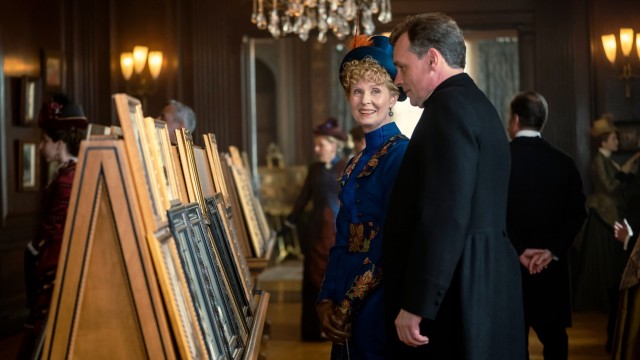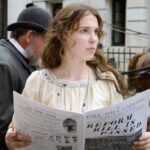The splendor of 1880s New York is tainted by secrets, betrayals, and surprising twists in “The Gilded Age” Season 2 Episode 3. This episode, “Head to Head,” takes viewers on an exhilarating journey into the elite’s lives, as personal tragedies take center stage and social conventions collide. tvacute breaks down the main themes of “The Gilded Age” Season 2 Episode 3, where fans are left aching to see what happens in this complex story of high society during the Gilded Age of New York.
Is Mr. Henderson based on a Real Labor Union Leader in The Gilded Age?
The episode, “Head to Head,” explores the complex web of interpersonal connections and social dynamics in 1880s New York. The biggest story is the disclosure of George Russell’s extramarital romance with Miss Turner, a bombshell that puts the Russell family’s carefully crafted façade in jeopardy.
The news of the Duke of Buckingham’s approaching visit and Peggy’s choice to go to Alabama serve as the opening points of the story. These incidents provide depth to the main plot and act as a backdrop for the main action.
The main focus of the episode is George’s grave error, which is his affair with Miss Turner. At an opera tea, Miss Turner—now the wealthy Mrs. Winterton—discloses George’s adultery to Bertha in a nonchalant manner. Tension mounts as Bertha (Carrie Coon), wearing a frock with trim resembling a lampshade, approaches George in his office.
A heated exchange of accusations and feigned apologies takes place throughout the subsequent conversation. The weak attempt at self-defense, George says he didn’t tell Bertha about Miss Turner because he thought Bertha “depended on her.” Bertha is understandably incensed over the betrayal and points out the cracks in their seemingly cohesive façade as robber barons who ascend the social ladder.
There is yet more drama to come. Later on in the day, George asks Bertha to help him at a luncheon for Mr. Henderson, the Pittsburgh union official. The tense relationship comes to light when George seeks Bertha’s assistance after becoming dissatisfied with Henderson’s apathetic attitude to a financial offer.
Bertha sticks to her guns and decides to eat by herself in her room because she is still furious about the earlier altercation. With a startling lack of patience, George wonders how long this rift will last. In response to Bertha’s uncertainty, which echoes the erratic nature of emotions, George melodramatically declares that it feels like a “death sentence.”
As the episode goes on, George grudgingly acknowledges his error, but it’s clear he doesn’t quite understand the seriousness of what he did. Viewers are left hanging by the unanswered tension, curious to see if George and Bertha’s disagreement can be reconciled in the upcoming episodes.
Oscar Wilde makes a disastrous cameo that adds humor to the story of the marital strife. But it also calls into question how historical personalities are portrayed, which gives the program another level of complexity.
Separately, Peggy’s (Denée Benton) choice to visit Alabama for Tuskegee Institute reporting sets up a subplot that delves into racial relations in America after Reconstruction. Incorporating Timothy Thomas Fortune, a historical individual with a personal association with slavery, enhances the examination of race and cultural transformations during this time.
Parallel to these events are the developing relationships between Marian and Dashiell, Oscar, Maud, Larry, and the widow, as well as the discovery of common ground between Ada and the reverend over clam chowder.
As the episode comes to a close, Bertha suggests that George (Morgan Spector) get the Duke of Buckingham to attend in order for there to be any chance of reconciliation. Fans of this complex story of love, treachery, and social scheming in the Gilded Age of New York are left on the edge of their seats, waiting for the next exciting twist.
The Gilded Age Season 2 Episode 4: Bertha competes with the Duke of Buckingham







